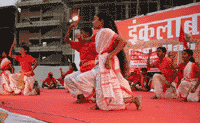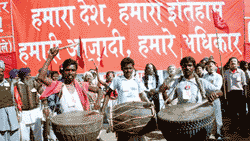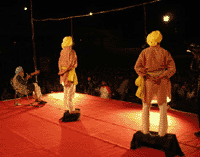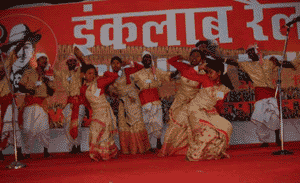

As a precursor to the 23rd March Inquilab Rally, three hundred cultural activists arrived in Delhi for celebrating resistance and assertion of the struggling people at a two day All India Cultural Meet. Denouncing the takeover of farmer's land for SEZs and the massacre at Nandigram, the performing artists asserted people's rights over history, freedom and resources. The first day of this assembly of theatre artists, musicians and dance troupes saw performances depicting the struggles, aspirations and hopes of the people. The gathering of people's artist—called Aaj ke Naam, after Faiz's well-known song Intesaab that pays tributes to ordinary workers, peasants, rickshawallahs, women and other marginalised section of society—remembered the sacrifices of the martyrs of people's struggle and celebrated their dreams for a better society. Thousands of people sat in the galleries and green grass of the Ambedkar Stadium in Delhi under a cloudy sky and the banners fluttering in the strong breeze to celebrate resistance.
The 21 st evening began with the martyr's song Karavan Chalta Rahega and Samay ka Pahiya by Hirawal, a performing group from Patna . The Paschim Banga Gana Sanskritik Parishad led by Prabir Bal sang songs of Tebhaga and Naxalbari and the continuing struggle of people in Singur and Nandigram. The Jharkhand Jan Sanskriti Manch sang songs in Santhali, Mundari and other languages of Jharkhand of tribal assertion in the backdrop of repression and land alienation.
Gurusharan Singh, veteran theatre artist from Punjab , who has fearlessly presented agit-prop during the National Emergency and the Khalistani movement, was the main performer on 21st evening. The 90-year-old Gurusharan Singh, who has defied political repression and known for his play Jangiram ki Haveli, spoke and narrated anecdotes from the life of Bhagat Singh, Sukhdev and Rajguru. His theatre troupe related and dramatised incidents from the life of ordinary people's heroes from Punjab .
 A dance-drama troupe from Karbi Anglong, in Assam performed the life of peasants in the North-Eastern corner of the country. Yuvaniti from Ara presented the play Golden Bird while the Sadao Asom Gana Sanskritik Parishad performed the Jhoomar, a traditional dance form. Bant Singh, agrarian leader who had to pay for resisting oppression, rendered Sant Ram Udhasi's songs. Several other groups performed late into the night at Ambedkar Stadium.
A dance-drama troupe from Karbi Anglong, in Assam performed the life of peasants in the North-Eastern corner of the country. Yuvaniti from Ara presented the play Golden Bird while the Sadao Asom Gana Sanskritik Parishad performed the Jhoomar, a traditional dance form. Bant Singh, agrarian leader who had to pay for resisting oppression, rendered Sant Ram Udhasi's songs. Several other groups performed late into the night at Ambedkar Stadium.
On 22nd March the evening began with songs by teams from ‘Rangmanch', Begusarai, ‘Yuvaniti', Arrah, ‘Karavan', Patna and ‘Jharkhand Jan Sanskriti Manch'. ‘Jan Sanskriti Mandali' teams from coastal Andhra and Srikakulam performed ballets on the life of the martyr's and rendered ballads and dances in their honour. 
The ‘Asom Gana Sanskriti Parishad', put up the delightful welcome of harvest with Bihu. The Karbi Cultural Society also danced in honour of the labour that goes into harvest and sang in honour of the village elders who had given their lives for people's welfare. ‘ Hirawal' sang the Intesaab and staged its play ‘Duniya Roz Badalti Hai' while the ‘Pashim Banga Gana Sanskritk Parishad' sang about Bhagat Singh in Bangla. ‘Begusarai JSM' performed Nagarjun's Harijan Gatha and Sangeeta Gaur and her team from ‘Asmita' sang protest songs. Manager Pandey, President of Jan Sanskriti Manch addressed the massive audience and the programme was conducted by JSM General Secretary, Pranay Krishna and Uttar Pradesh Secretary Ashutosh Kumar. Ramji Rai, Central Committee member and chief editor of Janmat spoke about the cultural elements of political resistance and the politics of culture.
At the Parade Ground, where several thousand people were arriving to participate in the Inquilab rally to assert their rights over the country, history and resources, several cultural teams joined the people to put up performances. Apart from the programmes held at Ambedkar Stadium the other productions included, the vigorous Chhau on the life of Birsa Munda by ‘Jharkhand Sanskriti Manch'. Yuvaniti put up the play Jamun ka Ped on the farce of development. The programme which began early in the evening of 22 March continued till the morning of 23 March.
The Inquilab Rally also began with performances by several groups and the rally ground resounded with determined songs of resisting oppression, displacement, eviction and injustice.